Charles E W Bean, Diaries, AWM38 3DRL 606/252/1 - 1918 - 1935 - Part 11
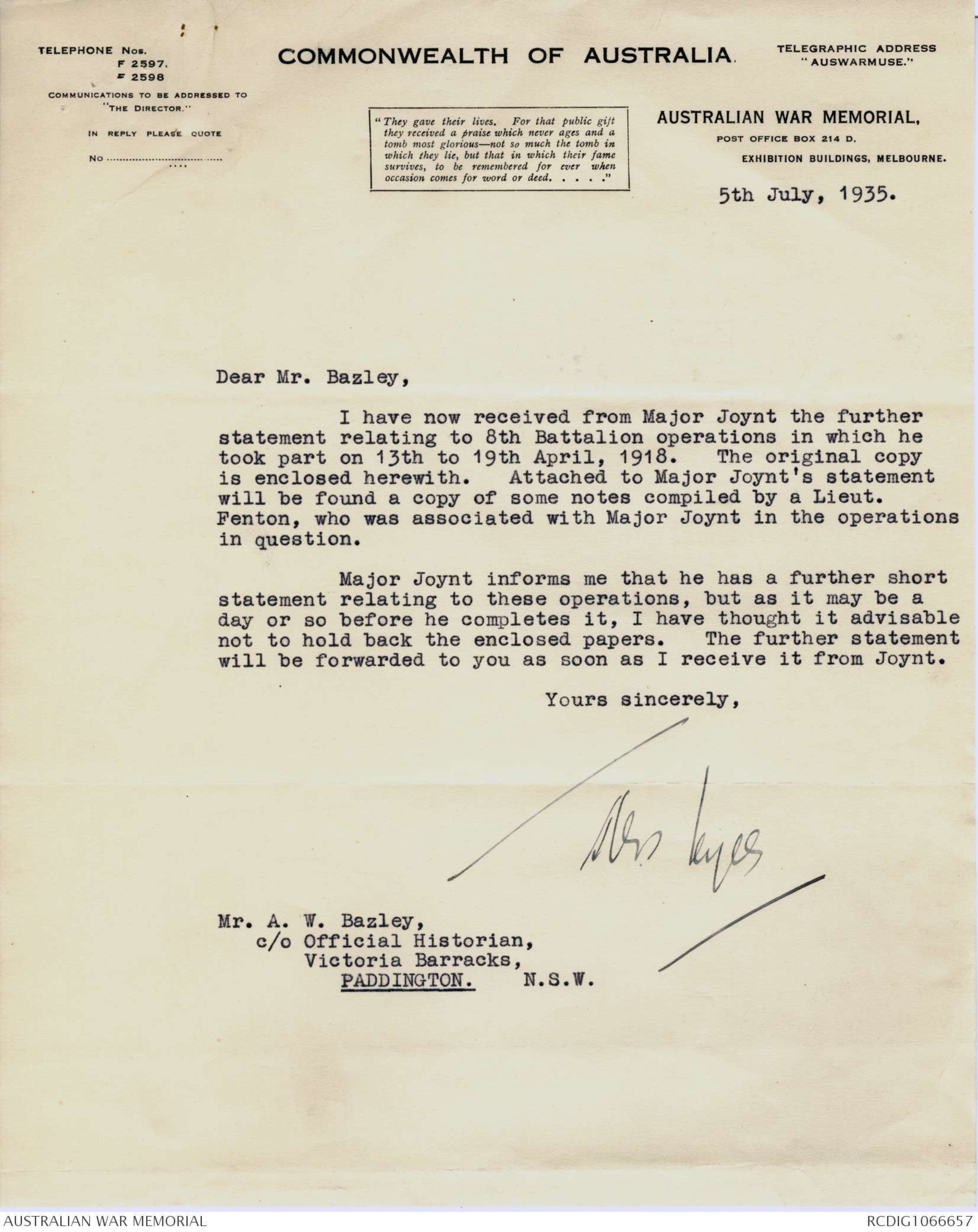
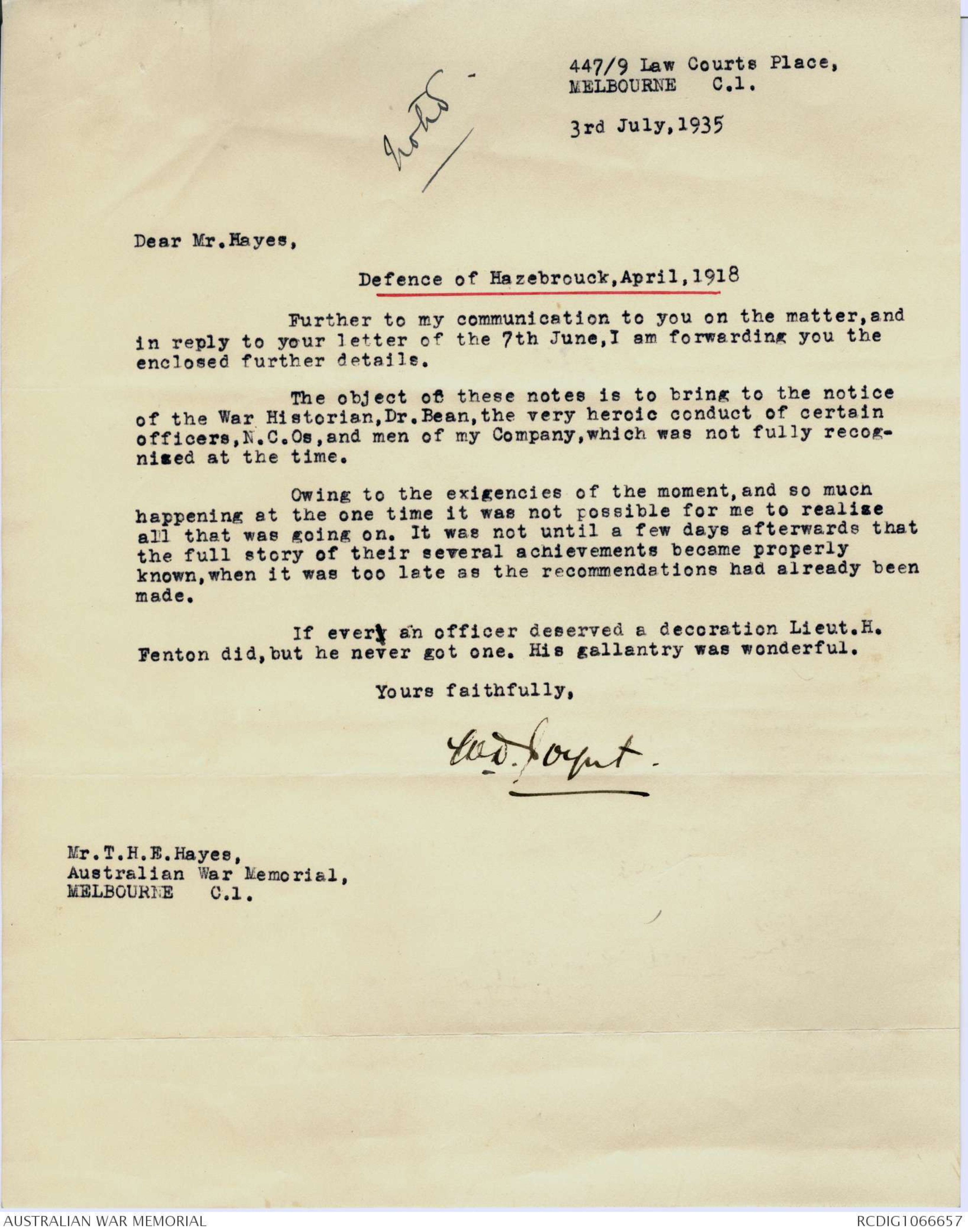
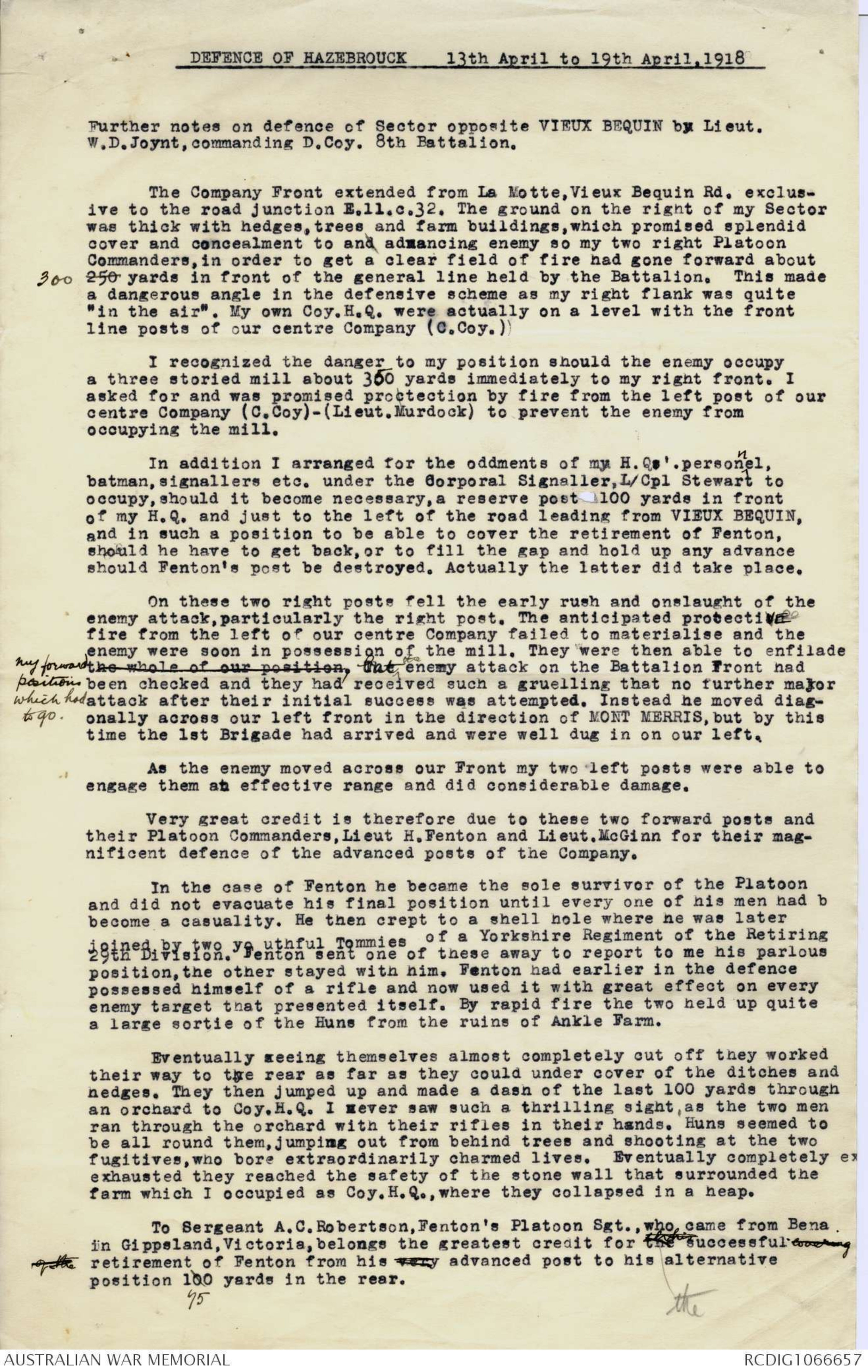
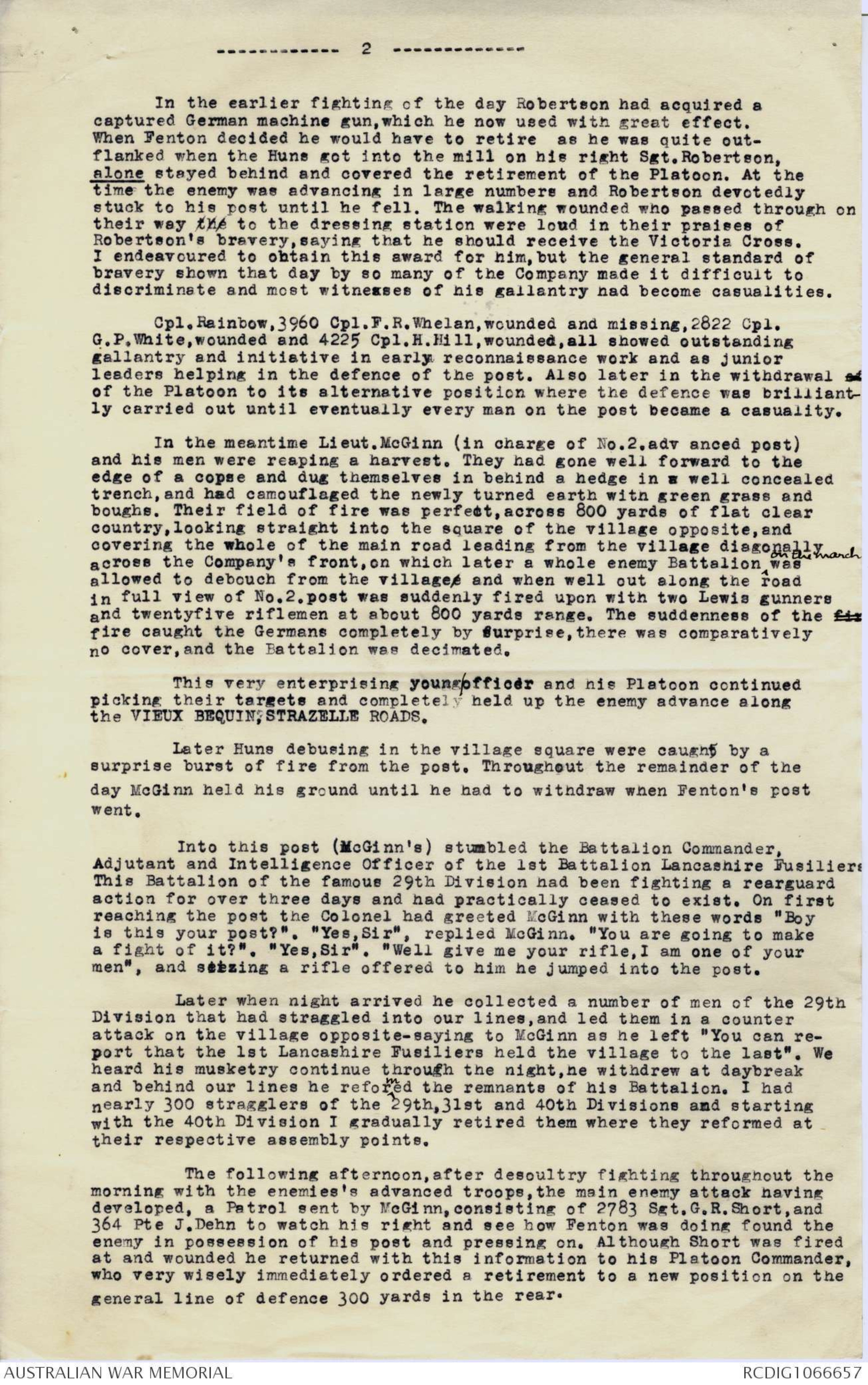
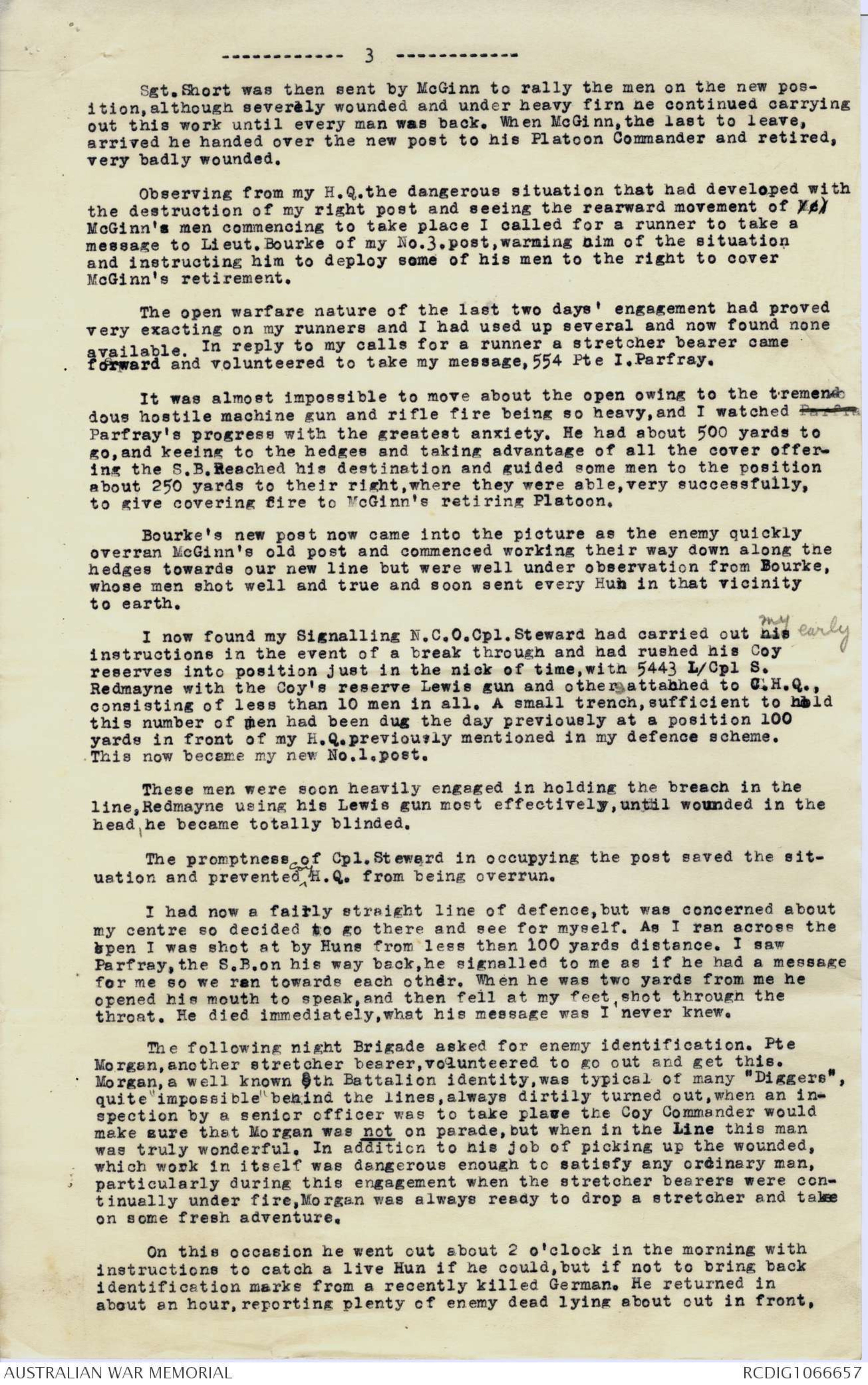
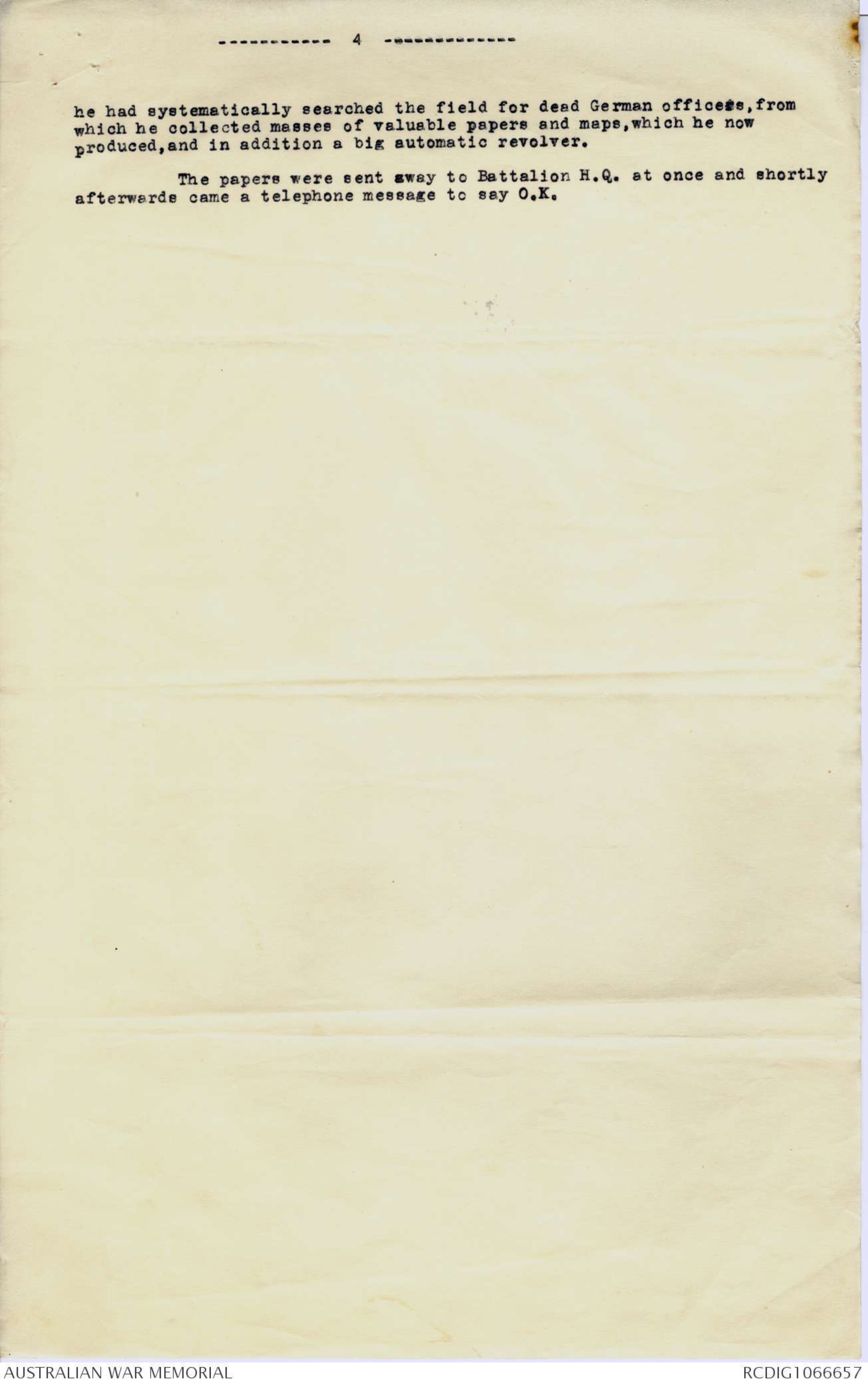
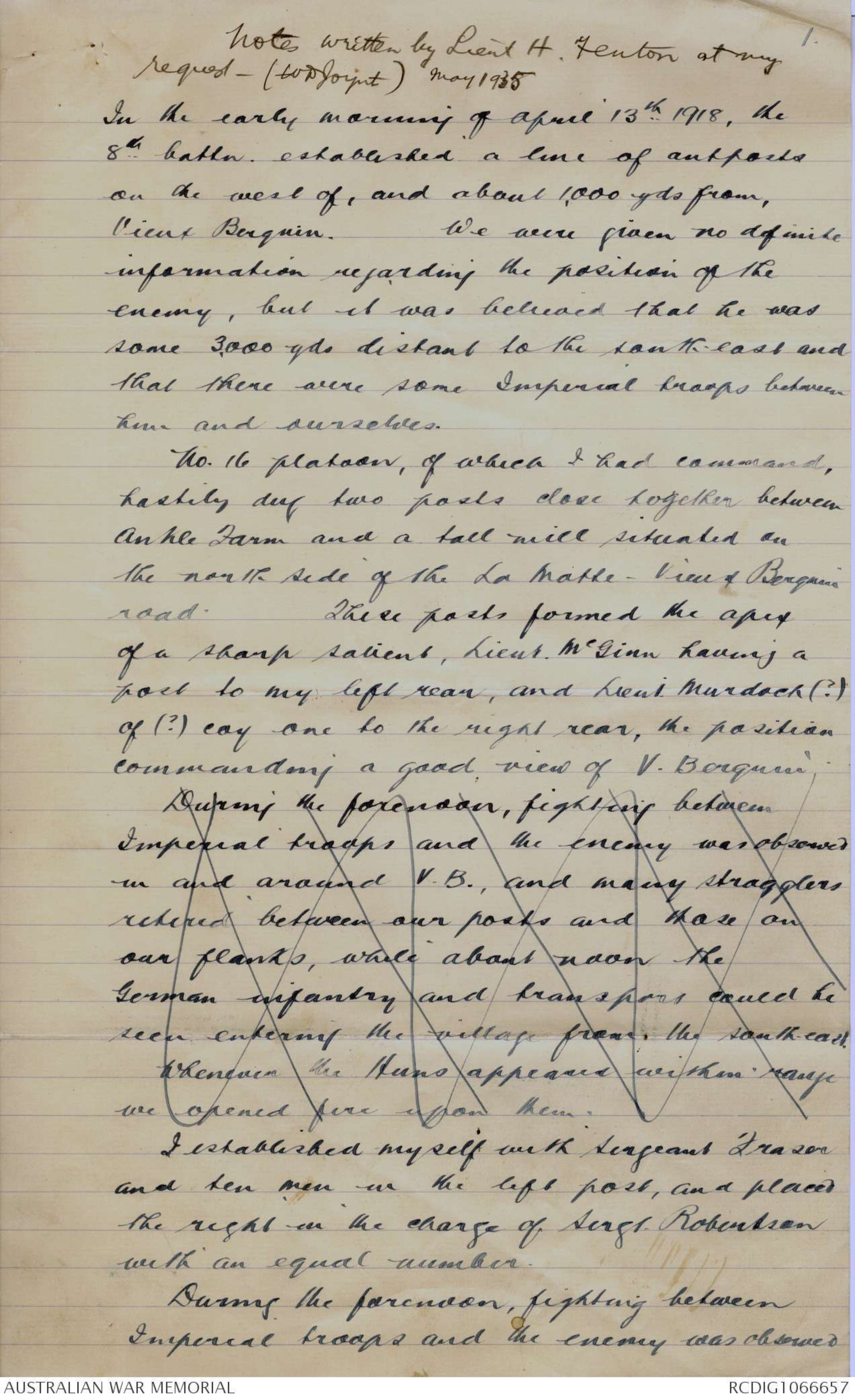
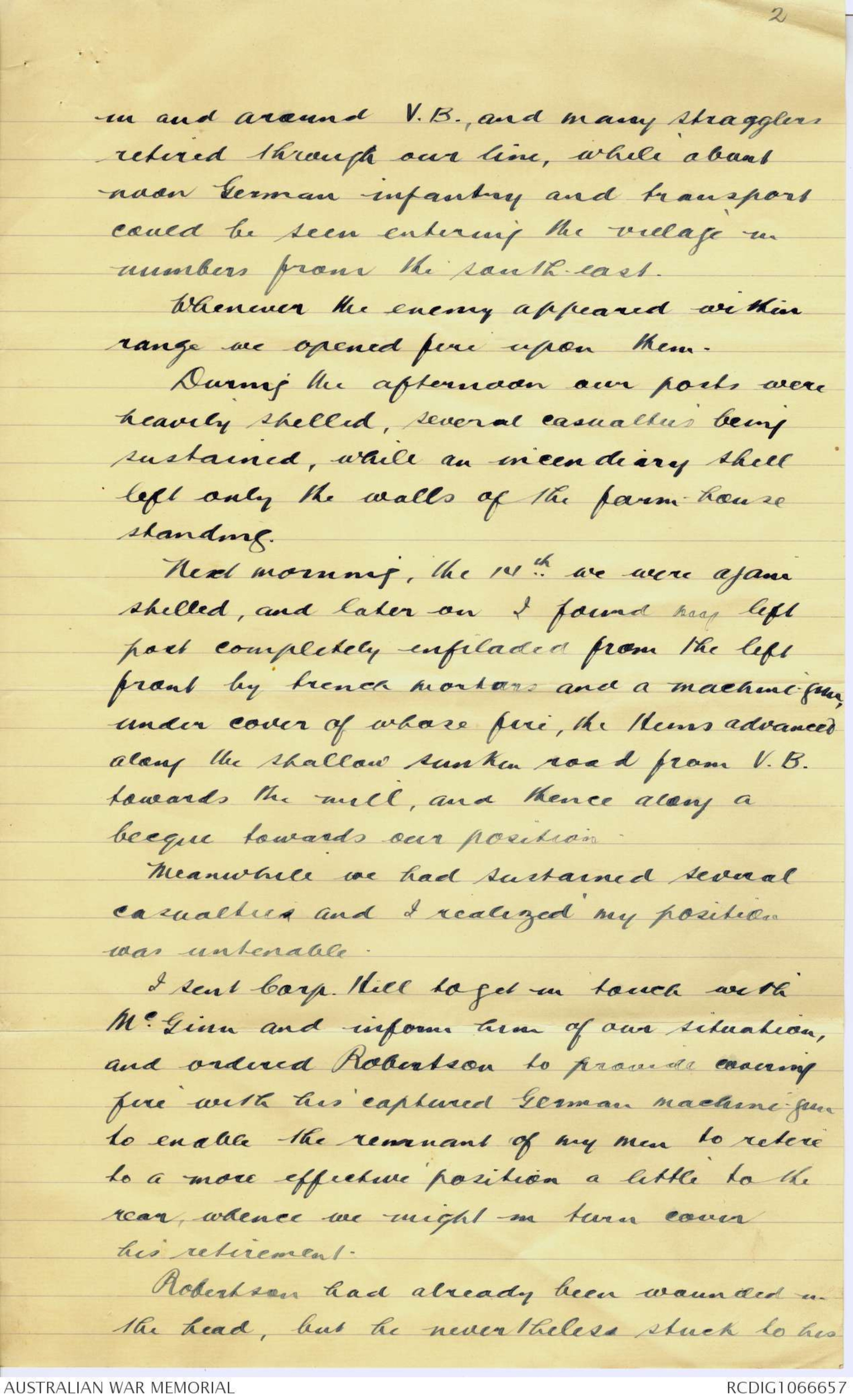
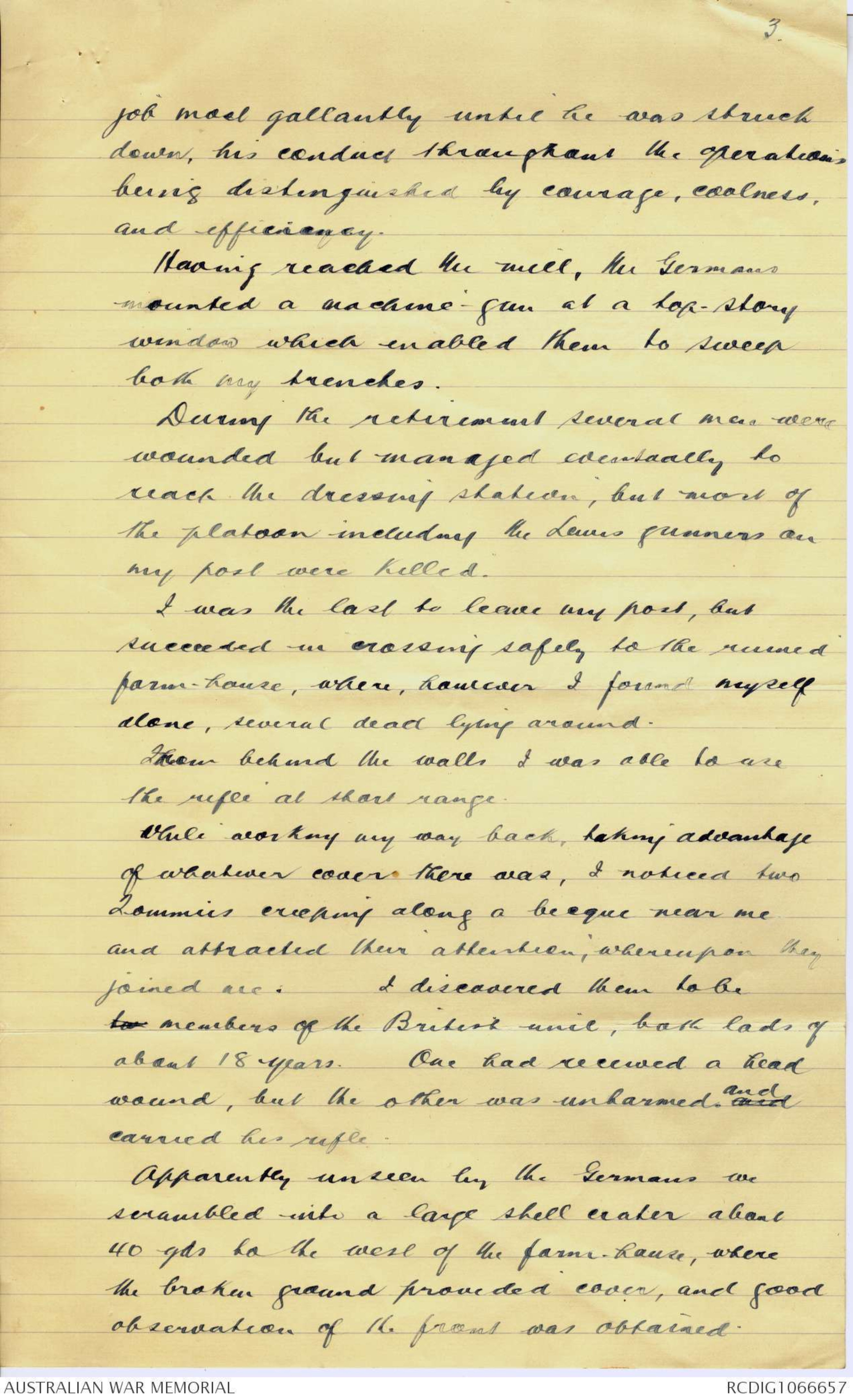
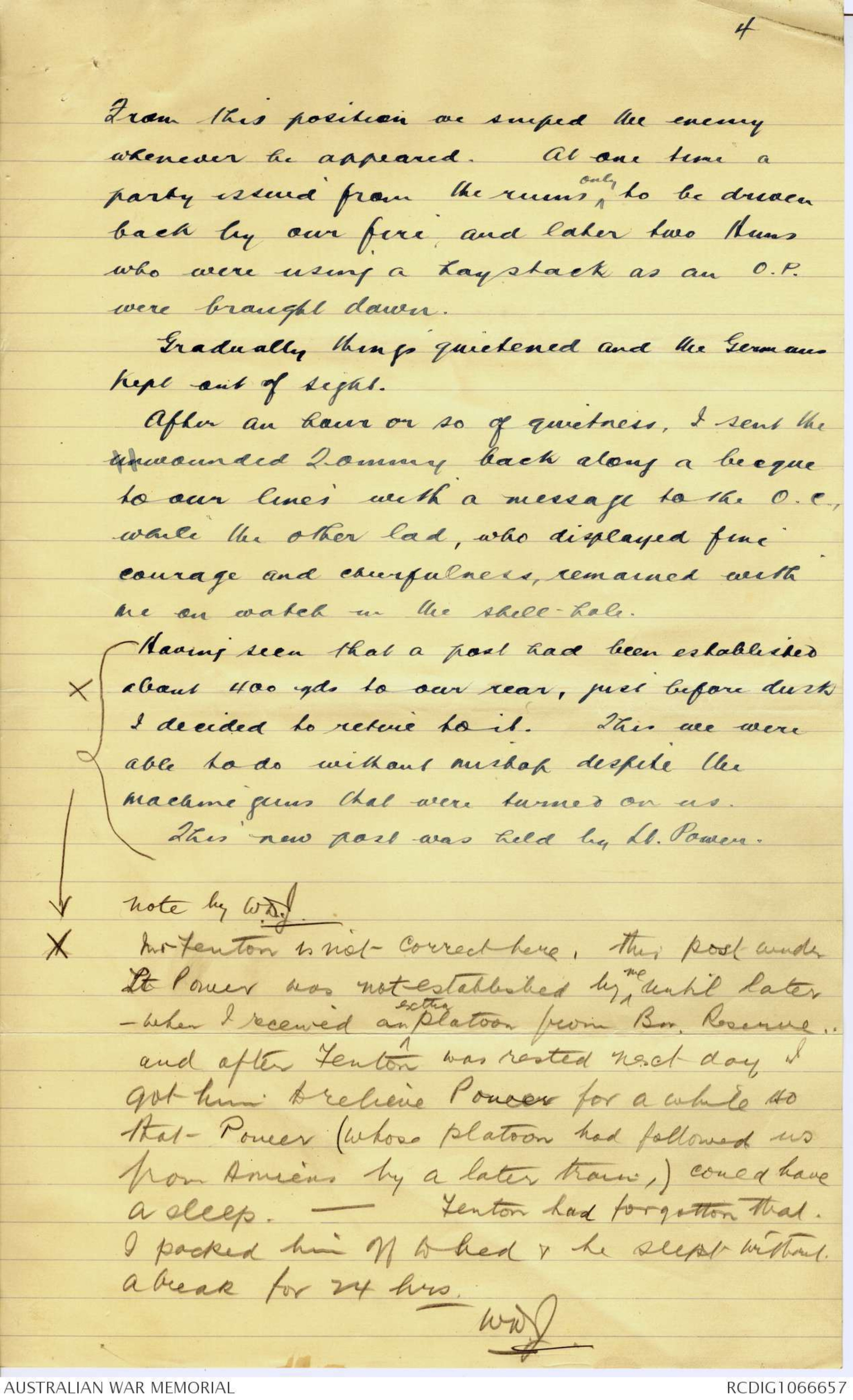
TELEPHONE Nos.
F2387.
F2598
COMMONWEALTH OF AUSTRALIA.
TELEGRAPHIC ADDRESS
“AUSWARMUSE.”
COMMUNICATIONS TO BE ADDRESSED TO
“THE DIRECTOR.”
IN REPLY PLEASE OUOTE
No ……
“They gave their lives. For that public gift
they received a praise which never ages and a
tomb most glorious—not so much the tomb in
which they lie, but that in which their fame
survives, to be remembered for ever when
occasion comes for word or deed..”
AUSTRALIAN WAR MEMORIAL
POST OFFICE BOX 214D.
EXHIBITION BUILDINGS, MELBOURNE.
5th July, 1935.
Dear Mr. Bazley,
I have now received from Major Joynt the further
statement relating to 8th Battalion operations in which he
took part on 13th to 19th April, 1918. The original copy
is enclosed herewith. Attached to Major Joynt’s statement
will be found a copy of some notes compiled by a Lieut.
Fenton, who was associated with Major Joynt in the operations
in question.
Major Joynt informs me that he has a further short
statement relating to these operations, but as it may be a
day or so before he completes it, I have thought it advisable
not to hold back the enclosed papers. The further statement
will be forwarded to you as soon as I receive it from Joynt.
Yours sincerely,
T H Hayes
Mr. A. W. Bazley,
c/o Official Historian,
Victoria Barracks
PADDINGTON. N.S.W.
Noted.
447/9 Law Courts Place,
MELBOURNE C.1.
3rd July, 1935
Dear Mr.Hayes,
Defence of Hazebrouck, April, 1918
Further to my communication to you on the matter, and
in reply to your letter of the 7th June, I am forwarding you the
enclosed further details.
The object of these notes is to bring to the notice
of the War Historian, Dr. Bean, the very heroic conduct of certain
officers, N.C.Os, and men of my Company, which was not fully recognised
at the time.
Owing to the exigencies of the moment, and so much
happening at the one time it was not possible for me to realise
all that was going on. It was not until a few days afterwards that
the full story of their several achievements became properly
known, when it was too late as the recommendations had already been
made.
If every an officer deserved a decoration Lieut. H.
Fenton did, but he never got one. His gallantry was wonderful.
Yours faithfully,
W.D. Joynt
Mr. T.H.E. Hayes
Australian War Memorial,
MELBOURNE C.1.
Defence of Hazebrouck 13th April to 19th April, 1918
Further notes on defence of Sector opposite VIEUX BEQUIN by Lieut.
W.D. Joynt, commanding D.Coy. 8th Battalion.
The Company Front extended from La Motte, Vieux Bequin Rd. exclusive
to the road junction E.11.c.32. The ground on the right of my Sector
was thick with hedges, trees and farm buildings, which promised splendid
cover and concealment to and advancing enemy so my two right Platoon
Commanders, in order to get a clear field of fire had gone forward about
300 250 yards in front of the general line held by the Battalion. This made
a dangerous angle in the defensive scheme as my right flank was quite
"in the air". My own Coy.H.Q. were actually on a level with the front
line posts of our centre Company (C.Coy.)
I recognized the danger to my position should the enemy occupy
a three storied mill about 350 yards immediately to my right front. I
asked for and was promised proctection by fire from the left post of our
centre Company (C.Coy)— (Lieut.Murdoch) to prevent the enemy from
occupying the mill.
In addition I arranged for the oddments of my H. Qs'. person^nel,
batman, signallers etc. under the Corporal Signaller, L /Cpl Stewart to
occupy, should it become necessary, a reserve post 100 yards in front
of my H.Q. and just to the left of the road leading from VIEUX BEQUIN
and in such a position to be able to cover the retirement of Fenton,
should he have to get back, or to fill the gap and hold up any advance
should Fenton's post be destroyed. Actually the latter did take place.
On these two right posts fell the early rush and onslaught of the
enemy attack, particularly the right post. The anticipated protective
fire from the left of our centre Company failed to materialise and the
enemy were soon in possession of the mill. They were then able to enfilade
[*my forward positions which had to go*] the whole of out position but ^the enemy attack on the Battalion Front had
been checked and they had received such a gruelling that no further major
attack after their initial success was attempted. Instead he moved diagonally across our left front in the direction of MONT MERRIS, but by this
time the 1st Brigade had arrived and were well dug in on our left,
As the enemy moved across our Front my two left posts were able to
engage them an effective range and did considerable damage.
Very great credit is therefore due to these two forward posts and
their Platoon Commanders, Lieut H. Fenton and Lieut. McGinn for their magnificent
defence of the advanced posts of the Company.
In the case of Fenton he became the sole survivor of the Platoon
and did not evacuate his final position until every one of his men had b
become a casuality. He then crept to a shell hole where he was later
joined by two youthful Tommies of a Yorkshire Regiment of the Retiring
29th Division. Fenton sent one of these away to report to me his parlous
position, the other stayed with him. Fenton had earlier in the defence
possessed himself of a rifle and now used it with great effect on every
enemy target that presented itself. By rapid fire the two held up quite
a large sortie of the Huns from the ruins of Ankle Farm.
Eventually seeing themselves almost completely cut off they worked
their way to the rear as far as they could under cover of the ditches and
hedges. They then jumped up and made a dash of the last 100 yards through
an orchard to Coy.H.Q. I never saw such a thrilling sight, as the two men
ran through the orchard with their rifles in their hands. Huns seemed to
be all round them, jumping out from behind trees and shooting at the two
fugitives, who bore extraordinarily charmed lives. Eventually completely ex
exhausted they reached the safety of the stone wall that surrounded the
farm which I occupied as Coy.H.Q., where they collapsed in a heap.
To Sergeant A.C. Robertson, Fenton's Platoon Sgt., who. came from Bena
in Gippsland, Victoria, belongs the greatest credit for ^the successful covering
[*of the*]retirement of Fenton from his very advanced post to his alternative
position 100 75 yards in the rear.
----------2------------
in the earlier fighting of the day Robertson had acquired a
captured German machine gun, which he now used with great effect.
When Fenton decided he would have to retire as he was quite outflanked
when the Huns got into the mill on his right Sgt. Robertson,
alone stayed behind and covered the retirement of the Platoon. At the
time the enemy was advancing in large numbers and Robertson devotedly
stuck to his post until he fell. The walking wounded who passed through on
their way the to the dressing station were loud in their praises of
Robertson’s bravery, saying that he should receive the Victoria Cross.
I endeavoured to obtain this award for him, but the general standard of
bravery shown that day by so many of the Company made it difficult to
discriminate and most witnesses of his gallantry had become casualties.
Cpl. Rainbow,3960 Cpl. F.R. Whelan, wounded and missing, 2822 Cpl.
G.P.White, wounded and 4225 Cpl.H.Hill, wounded, all showed outstanding
gallantry and initiative in early reconnaissance work and as junior
leaders helping in the defence of the post. Also later in the withdrawal a
of the Platoon to its alternative position where the defence was brilliantly
carried out until eventually every man on the post became a casuality.
In the meantime Lieut. McGinn (in charge of No.2.adv anced post)
and his men were reaping a harvest. They had gone well forward to the
edge of a copse and dug themselves in behind a hedge in x well concealed
trench, and had camouflaged the newly turned earth with green grass and
boughs. Their field of fire was perfect, across 800 yards of flat clear
country, looking straight into the square of the village opposite, and
covering the whole of the main read leading from the village diagonally
across the Company's front, on which later a whole enemy Battalion, ^ on the march was
allowed to debouch from the villagee and when well out along the road
in full view of No.2. post was suddenly fired upon with two Lewis gunners
and twentyfive riflemen at about 800 yards range. The suddenness of the fir
fire caught the Germans completely by surprise, there was comparatively
no cover, and the Battalion was decimated.
This very enterprising young/officer and his Platoon continued
picking their targets and completely held up the enemy advance along
the VIEUX BEQUIN; STRAZELLE ROADS.
Later Huns debusing in the village square were caught by a
surprise burst of fire from the post. Throughout the remainder of the
day McGinn held his ground until he had to withdraw when Fenton's post
went.
Into this post (McGinn’s) stumbled the Battalion Commander,
Adjutant and Intelligence Officer of the 1st Battalion Lancashire Fusilier
This Battalion of the famous 29th Division had been fighting a rearguard
action for over three days and had practically ceased to exist. On first
reaching the post the Colonel had greeted McGinn with these words "Boy
is this your post?". "Yes, Sir", replied McGinn. "You are going to make
a fight of it?'. "Yes, Sir". "Well give me your rifle, I am one of your
men", and seizing a rifle offered to him he jumped into the post.
Later when night arrived he collected a number of men of the 29th
Division that had straggled into our lines, and led them in a counter
attack on the village opposite-saying to McGinn as he left "You can report
that the 1st Lancashire Fusiliers held the village to the last". We
heard his musketry continue through the night, he withdrew at daybreak
and behind our lines he refor^med the remnants of his Battalion. I had
nearly 300 stragglers of the 29th, 3lst and 40th Divisions and starting
with the 40th Division I gradually retired them where they reformed at
their respective assembly points.
The following afternoon, after desoultry fighting throughout the
morning with the enemies’s advanced troops, the main enemy attack having
developed, a Patrol sent by McGinn, consisting of 2783 Sxt.G.R. Short, and
364 Pte J. Dehn to watch his right and see how Fenton was doing found the
enemy in possession of his post and pressing on. Although Short was fired
at and wounded he returned with this information to his Platoon Commander,
who very wisely immediately ordered a retirement to a new position on the
general line of defence 300 yards in the rear.
------------3------------
Sgt. Short was then sent by McGinn to rally the men on the new position,
although severely wounded and under heavy firn he continued carrying
out this work until every man was back. When McGinn, the last to leave,
arrived he handed over the new post to his Platoon Commander and retired,
very badly wounded.
Observing from my H.Q. the dangerous situation that had developed with
the destruction of my right post and seeing the rearward movement of Mc)
McGinn’s men commencing to take place I called for a runner to take a
message to Lieut. Bourke of my No.3. post, warning him of the situation
and instructing him to deploy some of his men to the right to cover
McGinn’s retirement.
The open warfare nature of the last two days’ engagement had proved
very exacting on my runners and I had used up several and now found none
available. In reply to my calls for a runner a stretcher bearer came
forward and volunteered to take my message, 554 Pte I. Parfray.
It was almost impossible to move about the open owing to the tremenddous hostile machine gun and rifle fire being so heavy, and I watched Parfr
Parfray’s progress with the greatest anxiety. He had about 500 yards to
go, and keeing to the hedges and taking advantage of all the cover offering
the S.B. reached his destination and guided some men to the position
about 250 yards to their right, where they were able, very successfully,
to give covering fire to McGinn's retiring Platoon.
Bourke’s new post now came into the picture as the enemy quickly
overran McGinn's old post and commenced working their way down along the
hedges towards our new line but were well under observation from Bourke,
whose men shot well and true and soon sent every Hun in that vicinity
to earth.
I now found my Signalling N.C.O.Cpl. Steward had carried out his ^my early
instructions in the event of a break through and had rushed his Coy
reserves into position just in the nick of time, with 5443 L/Cpl S.
Redmayne with the Coy's reserve Lewis gun and others attached to G.H.Q.
consisting of less than 10 men in all. A small trench, sufficient to hold
this number of men had been dug the day previously at a position 100
yards in front of my H.Q. previously mentioned in my defence scheme.
This now became my new No.1 .post.
These men were soon heavily engaged in holding the breach in the
line, Redmayne using his Lewis gun most effectively, until wounded in the
head, he became totally blinded.
The promptness, of Cpl. Steward in occupying the post saved the situation
and prevented ^ Coy H.Q. from being overrun.
I had now a fairly straight line of defence, but was concerned about
my centre so decided to go there and see for myself. As I ran across the
open I was shot at by Huns from less than 100 yards distance. I saw
Parfray, the S.B.on his way back, he signalled to me as if he had a message
for me so we ran towards each other. When he was two yards from me he
opened his mouth to speak, and then fell at my feet, shot through the
throat. He died immediately, what his message was I never knew.
The following night Brigade asked for enemy identification. Pte
Morgan, another stretcher bearer, volunteered to go out and get this.
Morgan, a well known 9th Battalion identity, was typical of many "Diggers",
quite "impossible" behind the lines, always dirtily turned out, when an inspection by a senior officer was to take place the Coy Commander would
make sure that Morgan was not on parade, but when in the Line this man
was truly wonderful. In addition to his job of picking up the wounded,
which work in itself was dangerous enough to satisfy any ordinary man,
particularly during this engagement when the stretcher bearers were continually under fire, Morgan was always ready to drop a stretcher and take
on some fresh adventure.
On this occasion he went out about 2 o'clock in the morning with
instructions to catch a live Hun if he could, but if not to bring back
identification marks from a recently killed German. He returned in
about an hour, reporting plenty of enemy dead lying about out in front,
------------4------------
he had systematically searched the field for dead German officers, from
which he collected masses of valuable papers and maps, which he now
produced, and in addition a big automatic revolver.
The papers were sent away to Battalion H.Q. at once and shortly
afterwards came a telephone message to say O.K.
1. Notes written by Lieut H. Fenton at my
request - (W0DJoynt) May 1935
In the early morning of April 13th 1918, the
8h batln established a line of outposts
on the west of, and about 1000 yds from,
Vieux Berquin. We were given no definite
information regarding the position of the
enemy, but it was believed that he was
some 3,000 yds distant to the south east and
that there were some Imperial troops between
him and ourselves.
No. 16 platoon, of which I had command,
hastily dug two posts close together between
Ankle Farm and a tall mill situated on
the north side of the La Motte-Vieux Berquin
road. These posts formed the apex
of a sharp salient, Lieut. McGinn having a
post to my left rear, and Lieut. Murdoch (?)
of (?) coy one to the right rear, the position
commanding a good, view of V. Berquin.During the forenoon, fighting betweenImperial troops and the enemy was observedin and around V.B. and many stragglersretired between our posts and those anour flanks, while about noon theGerman infantry and transports could beseen entering the village from the south-east.Whenever the Huns appeared within rangewe opened fire upon them.
I established myself with Sergeant Fraser
and ten men in the left post, and placed
the right in the charge of Sergt. Robertson
with an equal number.
During the forenoon, fighting between
Imperial troops and the enemy was observed
in and around V.B., and many stragglers
retired through our line, while about
noon German infantry and transport
could be seen entering the village in
numbers from the south-east.
Whenever the enemy appeared within
range we opened fire upon them.
During the afternoon our posts were
heavily shelled, several casualties being
sustained, while an incendiary shell
left only the walls of the farm-house
standing.
Next morning, the 14th we were again
shelled, and later on I found my left
post completely enfiladed from the left
front by trench mortars and a machine gun,
under cover of whose fire, the Huns advanced
along the shallow sunken road from V.B.
towards the mill, and thence along a
becque towards our position.
Meanwhile we had sustained several
casualties and I realized my position
was untenable.
I sent Corp Hill to get in touch with
McGinn and inform him of our situation,
and ordered Robertson to provide covering
fire with his captured German machine gun
to enable the remnant of my men to retire
to a more effective position a little to the
rear, whence we might in turn cover
his retirement.
Robertson had already been wounded in
the head, but he nevertheless stuck to his
job most gallantly until he was struck
down, his conduct throughout the operations
being distinguished by courage, coolness
and efficiency.
Having reached the mill, the Germans
mounted a machine-gun at a hop-story
window which enabled them to sweep
both my trenches.
During the retirement several men were
wounded but managed eventually to
reach the dressing station, but most of
the platoon including the Lewis gunners on
my post were killed.
I was the last to leave my post, but
succeeded in crossing safely to the ruined
farm-house, where, however I found myself
alone, several dead lying around.
From behind the walls I was able to use
the rifle at short range.
While working my way back, taking advantage
of whatever covers there was, I noticed two
Tommies creeping along a becque near me
and attracted their attention, whereupon they
joined me. I discovered them to betw members of the British unit, both lads of
about 18 years. One had received a head
wound, but the other was unharmed ard and
carried his rifle.
Apparently unseen by the Germans we
scrambled into a large shell crater about
40 yds to the west of the farm house, where
the broken ground provided cover, and good
observation of the front was obtained.
4
from this position we sniped the enemy
whenever be appeared. At one time a
party issued from the ruins ^only to be driven
back by our fire, and later two Huns
who were using a hay stack as an O.P.
were brought down.
Gradually things quietened and the Germans
kept out of sight.
After an hour or so of quietness, I sent theunwounded Tommy back along a becque
to our lines with a message to the O.C
while the other lad, who displayed fine
courage and cheerfulness, remained with
me on watch in the shell-hole.
X {Having seen that a post had been established
{about 400 yds to our rear, just before dusk
{I decided to retire to it. This we were
{able to do without mishap despite the
{machine guns that were turned on us.
{This new past was held by Lt. Power.
↓note by W.D.J
X Mr Fenton in not correct here, this post under
Lt Power has not established by ^me until later
- when I received an ^ extra platoon from Bn. Reserve
and after Fenton was rested next day I
got him to relieve Power for a while so
that Power (whose platoon had followed us
from Amiens by a later train,) could have
a sleep. - Fenton had forgotton that.
I packed him off to bed & he slept without
a break for 24 hrs.
WDJ
-
 Jane Brown
Jane BrownThis transcription item is now locked to you for editing. To release the lock either Save your changes or Cancel.
This lock will be automatically released after 60 minutes of inactivity.